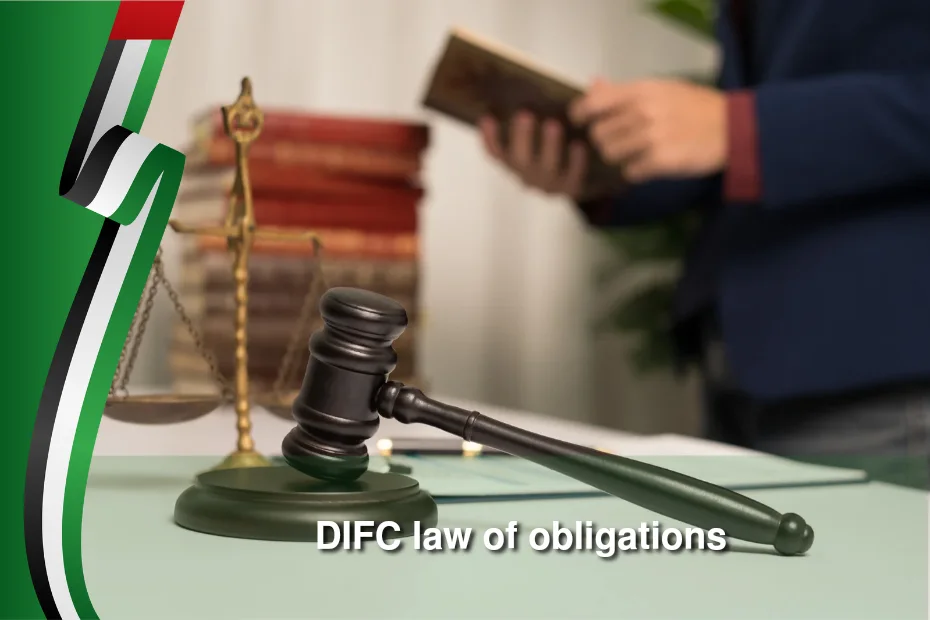The DIFC Law of Obligations is a foundational legal framework the Dubai International Financial Centre established. It governs commercial and personal obligations within the DIFC jurisdiction.
The initial legislation, DIFC Law No. 5 of 2005, established the base principles revised through various amendments to adapt to emerging challenges and enhance business practices.
DIFC Law Amendment Law No. 3 of 2024 and DIFC Law Amendment Law No. 2 of 2022 reflect the most recent changes, keeping the law current and effective.
Contact Al Mulla Law Firm in UAE. Click the WhatsApp icon below or go to the Contact Us page. Locations: Dubai, Abu Dhabi and Ras Al Khaimah.
Table of Contents
DIFC Law of Obligations Brief
- Enactment and Commencement Dates: The DIFC’s Law of Obligations was enacted in 2005. The latest amendments, through DIFC Law Amendment Law No. 3 of 2024 and DIFC Law Amendment Law No. 2 of 2022, are crucial. The 2024 amendment law requires that any dispute arising from digital transactions must follow the electronic documentation standards implemented on March 1, 2024. Businesses should be mindful of these dates to comply with the relevant versions of the law.
- Amendment Laws: Each amendment law modifies obligations to suit evolving business needs. DIFC Law Amendment Law No. 2 of 2022 included explicit guidelines on the responsibilities of payment intermediaries in financial transactions. For instance, intermediaries must provide transaction confirmations within 24 hours and maintain transparent fee structures. Failure to comply can lead to financial penalties or suspension.
- Contractual Obligations: The law emphasizes the principle of fair dealing in all contracts, including terms related to liability, delivery timelines, and termination clauses. For example, a supplier offering faulty goods may be liable to reimburse the customer fully if the defect affects the product’s usability.
- Financial Reporting Requirements: Financial intermediaries must submit quarterly reports detailing their activities, including any conflicts of interest. The reports must align with international financial reporting standards to ensure transparency.
- Consumer Protection: In cases involving consumer contracts, businesses must explicitly disclose fees, payment schedules, and any potential risks. An example would be requiring clear disclosure on loan agreements to prevent hidden charges. Learn about the DIFC law of damages and remedies.
- Enactment Notices: Official enactment notices provide practical clarifications. For example, the 2022 notices clarified that contract arbitration clauses must explicitly state the governing rules to be considered valid in the DIFC courts.
By understanding these regulations, businesses operating within the DIFC can ensure that their contracts, financial practices, and consumer dealings comply with the updated DIFC Obligations Law standards.
Legal Services Related to Law of Obligations DIFC
The office of Azza Ibrahim Hassan Al Mulla provides specialized legal consultations and services tailored to the unique requirements of the Law of Obligations in DIFC.
The firm’s expert DIFC Registered Lawyers can guide businesses and individuals on how to act according to the obligations, ensuring compliance with the most recent amendments.
Key Services:
- Contract Drafting and Review: Ensuring contracts are drafted or reviewed according to DIFC contract law standards, protecting clients from potential disputes.
- Dispute Resolution Advisory: Providing advice on dispute resolution under the DIFC framework, including negotiations, mediation, and formal litigation.
- Financial Obligations Compliance: Assisting clients in understanding and meeting the requirements regarding financial obligations and insolvency laws in DIFC to avoid penalties.
- Amendment Compliance: Offering guidance on aligning current business practices with the most recent DIFC Law Amendment Laws.
FAQs about Law of Obligations in DIFC
Conclusion:
Businesses operating in the DIFC must comply with the evolving DIFC Law of Obligations. Understanding the enactment dates, amendment laws, and notices can help companies better navigate the regulatory landscape.
The office of Azza Ibrahim Hassan Al Mulla offers expert legal services to help businesses and individuals comply with these regulations and ensure smooth operations within this financial hub.
Contact Al Mulla Lawyers today! Click the Whatsapp icon below or visit our Contact Us page.
Find us at these locations:
– Dubai: Deira, Port Saeed, Street 8, City Avenue Building, Office 705-708.
– Abu Dhabi: Corniche Street, Golden Tower, Office 22.
– Ras Al Khaimah: Al Nakheel, Al Maamoura Building (Emirates NBD Bank Building), Fourth Floor.
Omar Al Mansoori is an Emirati legal advisor and researcher with over 10 years of experience in civil, commercial, and corporate law in the UAE. He focuses on simplifying complex legal topics and ensuring that every article published aligns with the latest national legislation and official regulations.
